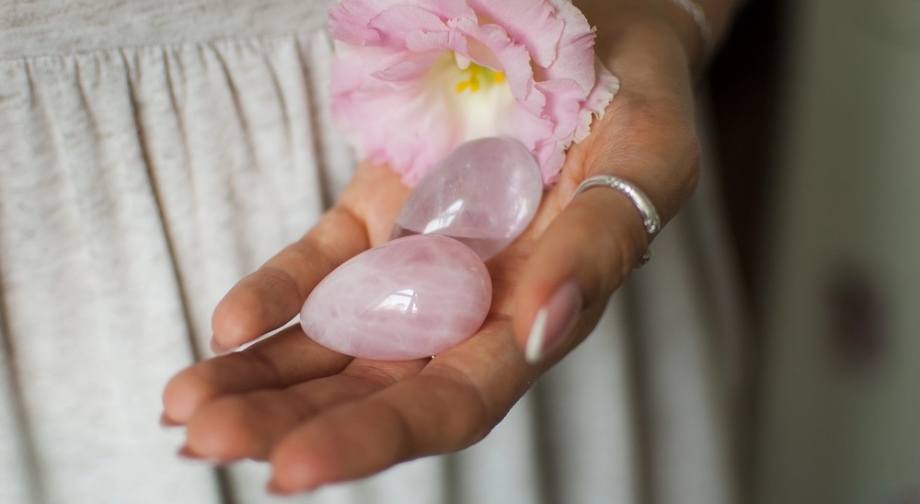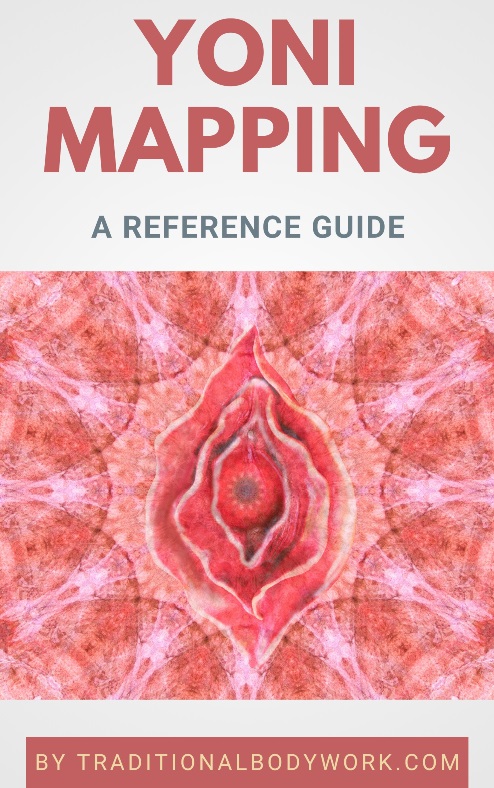
The Yoni Egg, also widely known as the Jade Egg or Love Egg, is a semiprecious stone or gemstone carved into an egg shape, polished, and subsequently inserted and carried inside the vagina.

The basic idea behind carrying the stone is that crystals and gemstones are thought to radiate certain frequencies with energetic, healing properties. Additionally, because the body must “clench” the egg to keep it inside the vagina, it is claimed that the Jade Egg automatically strengthens both pelvic floor muscles and vaginal muscles.
Then, doing certain exercises deliberately and consciously, that is, “working” with the Yoni Egg (using pelvic floor and vaginal muscles), is said to have many health benefits. In fact, so-called Kegel Pelvic Floor Muscle Exercises are the foundation of the Yoni Egg practice. Doing those with a Yoni Egg is supposed to enhance the Kegel practices.
The Yoni Egg is carried from a few minutes to overnight or the whole day. Usually, practice and habit is needed to be able to wear it for prolonged periods.
2. Supposed Health Benefits
3. More About the Pelvic Floor Muscles
4. More About the Genitals and Sexuality
5. More about Releasing Traumas and Blocked Emotions
6. Risks When Using the Yoni Egg
1. Further Introduction
You can find Yoni Eggs made of many types of crystals but not every crystal is safe to be carried inside the yoni, especially for longer periods of time. Traditionally, three types of crystals are used: Nephrite Jade, Rose quartz and Black Obsidian. These stones apparently have been used for centuries and are considered safe.
It is said that women have been applying this practice for thousands of years, notably in China where empresses and concubines of the Royal Palace used Jade Eggs to promote sexual energy, virility, awaken sensuality, and maintained their health while aging. If this is based on historical facts is heavily debated as researchers claim that nothing whatsoever about Jade or Yoni Egg applications is mentioned in ancient Chinese literature or art.
The word Yoni, by the way, is an Indian Sanskrit word for the female genitalia, among other meanings. Its symbol has been worshiped in Eastern cultures since ancient times as a reflection of life, procreation, creativity and love.
2. Supposed Health Benefits
As with many traditional healing practices, might it be massage or other bodywork, it takes time to reap the health benefits. Moreover, one needs to practice (or have treatments) regularly.
It’s generally thought that Yoni Egg benefits can start to show after three to five weeks of regular practice. Of course, the benefits established depend also on what type of Yoni Egg application (the kind of practice) you engage in, the type and materials of the Yoni Egg, the frequency of use, and so on.
Mind that the Yoni Egg benefits mentioned below are not scientifically proven. It’s a compilation of a range of benefits proclaimed by various Yoni Egg providers and Yoni Egg trainers/coaches.
- Awakens the vagina, enabling more sensitivity and pleasure;
- Opens up the opportunity to experience more intense orgasms and different kinds of orgasms;
- Helps control orgasms;
- Increases body awareness and supports the body to become more erogenous, sensitive, and orgasmic;
- Increases blood circulation to the genitals, inducing more intense feelings and better genital health;
- Helps promote fertility;
- Helps to heal energetic blockages;
- Helps balancing hormones;
- Helps to better relax the body and surrender to pleasurable feelings;
- Helps tightening and toning the vagina;
- Increases libido, sensuality, and sexual pleasure;
- Increases self-awareness, self-love, self-trust, self-respect, and sexual confidence;
- Stimulates mental health, healthy relationships, personal development, and spiritual practice;
- Removes feelings of guilt and shame;
- Helps to control and relax abdominal muscles, pelvic muscles, the vaginal walls, cervix and uterus;
- Releases general anxieties, trauma, emotional and sexual blockages, stress and tensions (both physical and emotional);
- Supports in having an easier childbirth (delivery);
- Supports in postpartum recovery;
- Alleviates or cures vaginal pains and pain during intercourse;
- Alleviates menstrual cramps and regulates periods;
- Improves bowel movement, digestion, and decreases constipation.
- Increases natural lubrication;
- Helps develop an intimate relationship with your body and yourself;
- Stimulates vaginal nerve endings and increases sensitivity during intercourse;
- Helps one to become multi-orgasmic;
- Stimulates reflexology points in the vagina benefiting various interconnected organs;
- Gives more control over the vaginal muscles;
- Strengthens the pelvic floor muscles;
- Supports bladder control;
- Reduces PMS symptoms and menstrual cramps;
- Improves overall health and well-being;
- Provides a stronger grip during penetrative sex;
- Reduces the risk of uterine prolapse.
3. More About the Pelvic Floor Muscles
The pelvic floor is a group of muscles in the pelvic area that forms a kind of diaphragm that supports all of our internal organs. In oriental practices like, for instance, Yoga, Thai Yoga (Reusi Dat Ton), Qigong, and Tai Chi, there is substantial emphasis given on doing pelvic floor exercises.
In the East, it’s claimed that Vital Life Force (Prana, Chi, or Qi) can leak through the pelvic floor and get lost if the pelvic floor muscles are weak. This is an issue because Prana or Qi is indispensable to maintain high levels of energy and gain longevity.
Today, things have perhaps a more down-to-earth connotation; we often sit still for longer periods and most of us seldom actively use the pelvic floor muscles. This can lead to health issues, such as painful menstruation, reproductive problems, loss of sensitivity and sensation, and lower energy levels. In fact, the main cause of these problems is attributed to the fact that there’s a lack of blood flow to this area of the body.
4. More About the Genitals and Sexuality
Many women in contemporary global culture experience issues having orgasms. One of the causes of this can be a disconnection from the body and genital area, and living too much in the mind.
Additionally, trauma and negative emotions stored in body cells, suppressed sexuality, feelings of abandonment, or even a simple lack of enough exercise or attention can be cause of turning many women’s genitals more or less dysfunctional.

The idea is that when practicing with a Yoni Egg, women can engage the muscles of the vagina and the pelvic floor bringing attention and awareness to the sexual organs and increased sensitivity. It’s also said that the practice stimulates the Bartholin glands inside the vagina, which are responsible for natural lubrication.
The Yoni Egg is supposed to also support restoring the elasticity and suppleness of women’s sexual organs (vagina and uterus) to the pre-pregnancy state after childbirth. Moreover, there are also exercises prescribed specifically designed to prepare women for delivery.
Finally, it’s said that practicing with the Yoni Egg can teach women to experience prolonged and also different kinds of orgasms such as vaginal, cervical and uterine orgasms.
5. More About Releasing Traumas and Blocked Emotions
Psychological and physical traumas may be stored and crystallized in the body, and a certain amount of those could be stocked in the Yoni. This is not only about sexual traumas, but can also include other emotional issues.
Releasing tension in the Yoni can support releasing trauma and remove psychological blockages, thereby improving overall physical and mental health and a better sex-life. Moreover, liberating our sexual energy reflect itself in higher creative potential and longevity.
6. Risks When Using the Yoni Egg
Although the benefits of carrying and/or practicing with a Yoni Egg sound wonderful, there are several risks, precautions, and contraindications to be taken into account before using it.
Let’s take a look at the following issues:
- One of the health risks is that even the toughest eggs are porous (or somewhat porous, depending on the type of gemstone) and can hold bacteria. It means that it’s not always possible to really, completely clean the egg in between each use. This can cause infections.
- Harmful bacteria can build up in crystals, increasing the risk of certain specific infections, such as bacterial vaginosis and toxic shock syndrome.
- Also, because the egg has a glass-like, slippery texture, it can be rather hard (or stressful) to remove. This is partially counteracted by having a string attached to them, but in very exceptional cases extraction could mean visiting a gynecologist or emergency room.
- The vagina will naturally produce more discharge when a foreign object is placed in it, so it’s possible that lubrication increases, but not in the sense that is desired.
- Never use the Yoni Egg in the rectum; it can get stuck there.
- It’s not advised to use a Yoni Egg during sexual intercourse, because doing so can cause injuries to your vaginal canal and maybe also to your partner;
- It’s not advised to sleep with a Yoni Egg overnight; your Yoni and pelvic floor need rest also, besides the fact that some pain receptors turn off while you sleep and damage may occur internally without you knowing it;
- It’s not advised carrying a Yoni Egg while you’re menstruating (have your period), although this is contested by some Yoni Egg trainers. In any case, mind that an egg inside the vagina can restrict or block discharge, which in itself is not a healthy thing;
- Continuously contracting the pelvic floor muscles can also create tension in the pelvic floor. This can create health issues like constipation or bowel strain, pain in the pelvic region, pain during vaginal penetration, muscle spasms in the pelvic floor, lower back and abdominal pains.
- Long-lasting insertion of the Yoni Egg can also prevent natural discharge from properly draining. So, when you shut off the vagina, one interferes with its self-cleaning abilities, which in its turn can cause harmful materials and bacteria to accumulate.
- As the Yoni Egg is typically a stone or crystal, rough spots or cracks could cause irritation, scratches or tears in the vaginal tissue.
- Some women may be allergic to the specific material a Yoni Egg is made of;
- The Yoni Egg should always be cleaned thoroughly before and after use; not doing so increases the risk of infections;
- Finally, it’s said that the Yoni Egg should not be worn if a woman is pregnant, has an IUD (intrauterine device inserted into the uterus to prevent pregnancy), suffers from an active vaginal infection or Sexually Transmitted Disease (STD), Thrush (Candidiasis fungal infection), or other pelvic health issue.
In any case, if you’re not sure if you can safely carry a Yoni Egg, or if you had a serious preexisting condition, please first consult your physician or other appropriate healthcare provider before using one.















